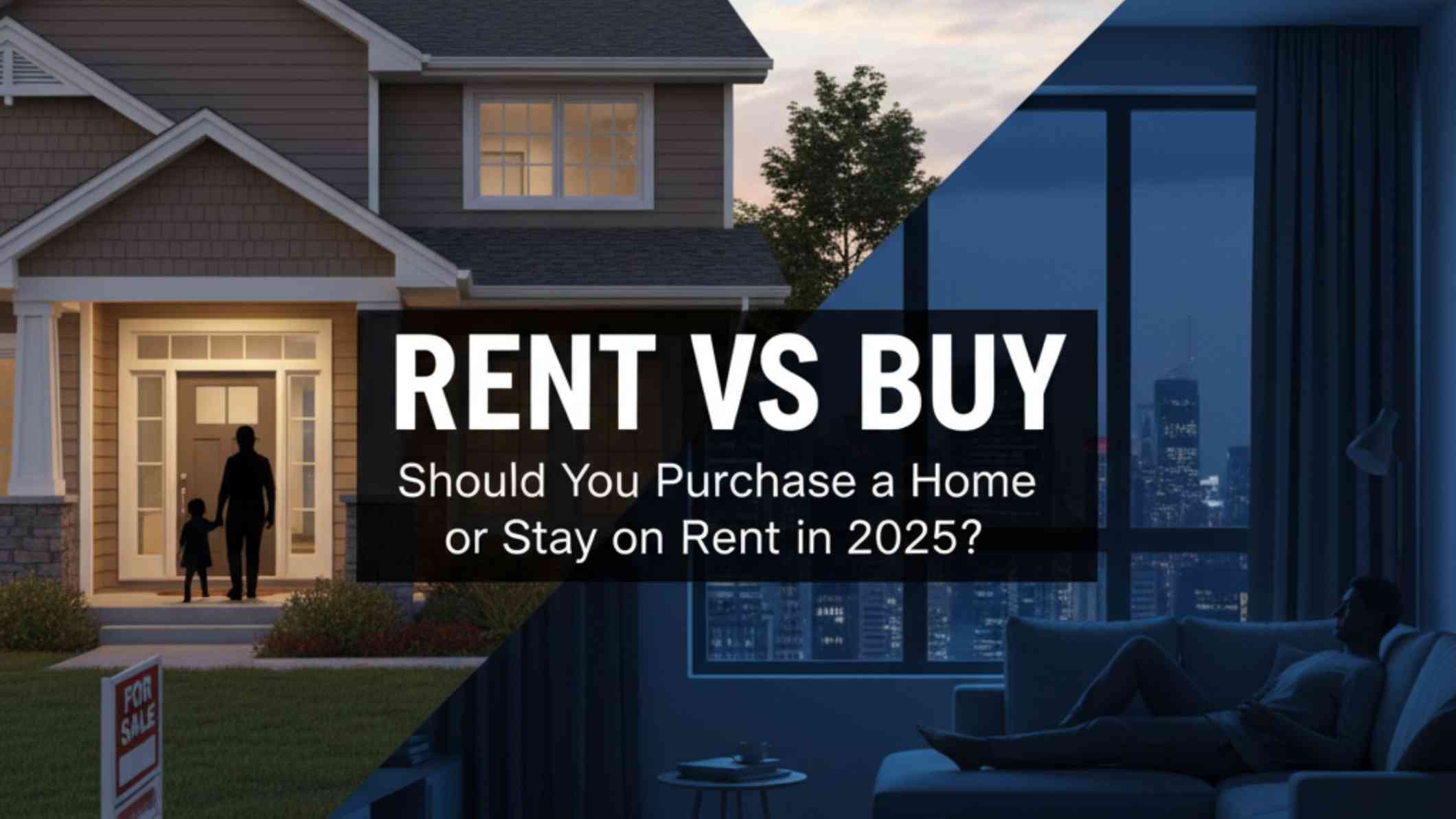Debt Awareness · 5 min read
Rent vs Buy: Should You Purchase a Home or Stay on Rent in 2025?
Is it smarter to buy a home or continue living on rent in 2025? Discover the financial, emotional, and practical factors behind the rent vs buy debate in India and learn how to make the right choice for your lifestyle and budget.

Owning a home has always been the ultimate dream for India’s middle class. But with property prices skyrocketing, that dream now comes with a heavy price tag. In most major Indian cities, owning a decent home easily costs ₹1.5 crore or more, meaning a monthly EMI of ₹70,000–₹75,000 for the next 20 years. In contrast, renting the same home could cost you only ₹35,000–₹40,000 a month. So the big question arises , is it smarter to buy or rent? People often argue that “renting is a waste of money,” while others say “buying puts you in a financial trap.” Let’s break this emotional and practical debate down and see which side really makes sense.
The Emotional vs Practical Debate
In India, owning a home isn’t just a financial goal , it’s an emotional and social milestone. Parents often say, “Beta, buy your own house , how long will you live on rent?” After marriage, relatives add pressure: “It’s time to buy a flat now!” This social expectation pushes many people to make one of the biggest financial commitments of their lives , sometimes too early.
Take the story of a friend who bought a house in his late 20s under family pressure. Within a few years, his family grew, but his house didn’t. The loan EMI tied him down — he couldn’t move, upgrade, or switch jobs freely. What was meant to be a “dream home” became a source of financial and emotional stress.
And here’s the real irony , during the first 7–10 years of a home loan, most of your EMI goes towards interest, not ownership. You think you’re building an asset, but in reality, you’re paying rent to the bank.
On the other hand, renting gives you freedom and flexibility. You can relocate, change jobs, or move closer to work without worrying about selling a property. The catch? Society still labels renters as “unsettled.”
So the real question becomes: Do you value stability or flexibility more right now?
The Real Money Math
Let’s move from emotions to pure numbers.
Buying a House
Suppose you buy a home worth ₹1 crore.
● Down payment: ₹20–25 lakh upfront
● Stamp duty and registration: 5–7% (₹5–7 lakh)
● Loan amount: ₹75–80 lakh
● EMI: ₹55,000–₹60,000 per month for 20 years at 8% interest
For the first few years, you’re mostly paying interest, not owning much of the property. Plus, there are maintenance costs, society charges (₹4,000–₹5,000/month), property taxes, and interior expenses that can easily add ₹20–25 lakh over five years.
Renting the Same House
The same property can be rented for around ₹35,000–₹40,000 a month. Even if rent increases 7–8% annually, it remains cheaper than EMI for many years. More importantly, you save that ₹25 lakh down payment and the EMI–rent gap, which can be invested smartly in SIPs or mutual funds.
If you invest ₹12,000–₹15,000 a month for 15 years, it can grow to nearly ₹1 crore — building wealth while maintaining flexibility.
Tax Impact
Homebuyers often cite tax benefits, but under the new tax regime, these benefits have reduced. Renters, meanwhile, enjoy HRA exemptions, lowering their taxable income.
Experts also point to India’s low rental yield, averaging only 2–6% in metros. This means your property generates very little rental income compared to its value , making renting financially smarter in the short and medium term.
Stability vs Freedom: The Lifestyle Trade-off
Buying a house gives you stability — a permanent address, predictable school and community life, and emotional satisfaction. Celebrating festivals in your own home feels special.
But stability has a cost , reduced flexibility. A home loan can tie you down. Losing a job, getting a transfer, or wanting a career change becomes harder. Many people end up feeling trapped by their EMI commitments.
Renting, on the other hand, offers freedom — to move cities, upgrade or downsize as your life changes, and avoid long-term financial stress. The downside? Dealing with landlords, rent hikes, and the lack of “permanence.”
In simple terms , buying gives stability, renting gives flexibility. The right choice depends on what stage of life you’re in and what matters more to you right now.
When Buying Actually Makes Sense
Buying a home isn’t always wrong — it just needs the right timing and financial readiness. Here’s when buying makes sense:
Long-term clarity: You plan to live in the same city for the next 10–15 years.
Healthy EMI ratio: Your EMI shouldn’t exceed 30–35% of your monthly income.
Emergency buffer: Keep at least 6 months’ EMI saved for emergencies.
Balanced investing: Even after buying, invest 15–20% of your income elsewhere (stocks, gold, mutual funds).
Good location: Buy in developing areas with infrastructure and job growth — not just for emotional satisfaction but for appreciation potential.
Final Thoughts
So, should you buy or rent?
There’s no universal answer , it depends on your financial situation, goals, and mindset. Buying gives pride and stability. Renting gives flexibility and freedom. The key is not to follow social pressure, but to follow your financial readiness.
A house is an asset only if it strengthens your future, not if it locks you in debt.
Disclaimer
The information shared in this blog is for general awareness only. Every individual’s situation may differ, and the actual process or outcome can vary based on personal and legal circumstances.

.kYF4YWoS.jpg)

